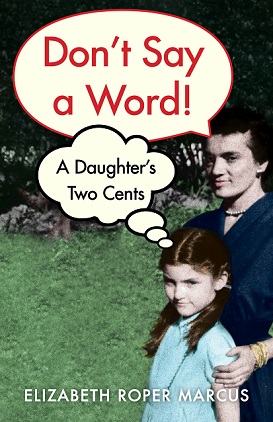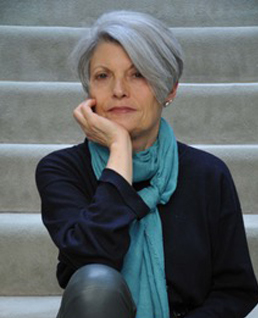The meaning of my parents’ strange about-face was the hardest puzzle I’ve ever tried to solve. I could only do it after both had died. I had to work to view them as complex human beings, not through the lens of their being my parents, in order to see what was actually staring me in the face.
Elizabeth Roper Marcus – 11 May 2021
The Back Flap
Edna and Leo, a perpetually warring, tyrannical pair in their 80s, begin wintering In Mexico, where they abandon their usual prudence to embrace adventure and a bevy of sketchy new friends. Soon, Edna adopts a pair of shyster builders whom she trusts over her own architect-daughter Elizabeth, and a farcical house results. Blithely indifferent to the calamities that result, the pair refuse all help from their too-compliant only child.
Later, following her mother’s sudden death, Elizabeth’s wise, principled father attempts to fill his late wife’s shoes with a string of loopy, live-in housekeepers—with privileges, he hopes. Before it is over the Mexican escapade will bring down the kind of disasters commonly found in pulp fiction. Why can’t Elizabeth stop any of this from happening? No matter the madness, she cannot confront her parents any more than she ever could. In the end, the surprising way in which they come undone reveals just what they spent their lives trying to hide, thereby setting her free.
Though unique in its loony details, Don’t Say A Word! will resonate with beleaguered adult-children everywhere who will recognize the special misery of watching, helpless, as stubborn, diminished parents careen precariously toward the end of life.
About the book
What is the book about?
At the end of my parents’ lives they retired to Mexico where they cut loose, adopted some sketchy new friends, and brought down on themselves a string of screwball catastrophes that left me mystified. All my efforts to protect them from themselves failed miserably. But, when I finally figured out what was behind my parents’ strange metamorphosis, it set me free.
When did you start writing the book?
It feels like a very long time ago, at least a decade but perhaps even longer.
ow long did it take you to write it?
The first draft took less than a year and felt like a great unburdening, but it took years to edit it into a book, which I put aside for a long time, as well.
Where did you get the idea from?
Even while it was happening, I thought that my parents’ unraveling was simultaneously astonishing, horrific, and hilarious. A great story fell into my lap.
Were there any parts of the book where you struggled?
The meaning of my parents’ strange about-face was the hardest puzzle I’ve ever tried to solve. I could only do it after both had died. I had to work to view them as complex human beings, not through the lens of their being my parents, in order to see what was actually staring me in the face. For a long time, the answer to the puzzle seemed to hover just beyond my grasp. When the Aha! moment finally arrived, I was sitting in an airport waiting room and burst into wracking sobs.
What came easily?
Telling the story. The title of the book is the first line. My mother is about to announce something she knows is a bad idea, and she orders me not to say what I think. The book is my 90,000-word reply. Finally speaking up was thrilling.
Are your characters entirely fictitious or have you borrowed from real world people you know?
I have done my best to be absolutely honest. I’ve changed the names of all the bad players, but that’s it.
Do you have a target reader?
Adult-children of enraging, aging parents; daughters with hyper-critical mothers; daughters with sexually inappropriate fathers; people thinking of retiring to Mexico, anyone trying to understand who their parents really are.
About Writing
Do you have a writing process? If so can you please describe it?
I always start with a question, a question no one seems to be asking but which I sense has a really interesting answer. I write down all my initial thoughts and do a lot of research. Generally, I only figure out the answer to the question in the struggle to write about it. In the case of this book, the question was: what in the world was going on with my parents????
Do you outline? If so, do you do so extensively or just chapter headings and a couple of sentences?
I gather my thoughts in no particular order, and then I struggle to get the progression of ideas into an outline. When I start the writing, I think I have a clear line of thought, but I never do.
Do you edit as you go or wait until you’ve finished?
All of the above. I edit what I’ve written at the end of the day and again when I start in the morning, and then I go back to edit bigger chunks as I go along. When I get to the end, I start from the beginning and edit the whole thing over and over. The first draft is always, always horrible, and the second draft only a little less bad, so I have to make the early parts passable, or I’ll lose heart. It’s like The Twelve Days of Christmas, where each day you reprise all the previous days and add a new one at the end. By the time I get to the last line, the beginning is pretty good!
Did you hire a professional editor?
I wrote the book in a writing group, so I had a lot of readers weighing in from the beginning. The editor I hired cleaned up the prose and found inconsistencies and bad word choices. The editor at She Writes Press did another cleanup job with word choice and punctuation. And I am just starting to proofread the galley.
Do you listen to music while you write? If yes, what gets the fingers tapping?
No. I can’t work if there is any sound at all. I have to think really hard the whole time.
About Publishing
Did you submit your work to Agents?
I submitted a query for the book to one agent who never replied. I knew it was foolish to give up after one rejection, but I was so disheartened I put the book in a drawer for many years.
What made you decide to go Indie, whether self-publishing or with an indie publisher? Was it a particular event or a gradual process?
When a friend decided to publish her book with She Writes Press, I realized I was never going to do the agent search—too much time had passed without my getting myself do it—and here was a straight road to finally publishing my book. The press is wonderful. Everyone is truly devoted and accessible. They give tremendous support and have an excellent system for moving you through the process from manuscript to finished product.
Did you get your book cover professionally done or did you do it yourself?
She Writes has a book designer. I’ve been to design school and architecture school and I need to be in control of all the aesthetics in my life, so I was a real pain to work with. The publisher, the designer and I really struggled. But in the end we came to a compromise that I think we’re all very happy with. One of the great things about working with She Writes is that you maintain a lot of control over the decision making. With a conventional publisher, you don’t own your book; you can’t choose the title or weigh in on the cover. You give up a lot of control, and the publisher just takes over. Of course, with control comes work.
Do you have a marketing plan for the book or are you just winging it?
I‘ve spent so many years not publishing this book, that I decided to get all the help I could to promote it. I have a publicist and a marketing guy helping me. And I follow their orders.
Any advice that you would like to give to other newbies considering becoming Indie authors?
If you are female, I would definitely encourage you to submit to She Writes. It is more expensive than self-publishing, but they provide extensive support every step of the way, not just with the completion of the book but also with promotion. The publisher does wonderful webinars at each stage of the process; they have a sales force; and they use the same distributer as standard publishers. It’s also fun to be working with an all-female team and to be in a cohort of all-female writers on the same publishing schedule. There is a strong sense of sisterhood. You should really consider them.
About You
Where did you grow up?
New York City
Where do you live now?
Boston
What would you like readers to know about you?
For all the frustrations, I have loved every minute of writing and publishing this book. Most of what I can say about myself is obvious if you read anything I write: I want to get to the bottom of things, to extract the maximum meaning out of experience. I tend to see the humor in mishap and failure. Humor is a survival mechanism for me. I wear my neuroses on my sleeve. I’m compulsively honest. Life it short: I don’t want to waste any of it by skirting what is awkward or embarrassing. For me, the road to happiness lies in turning garbage into gold.
What are you working on now?
I’m working on book promotion, which means writing short pieces for magazines, doing podcasts, being active on social media, and giving interviews like this one. It’s all new to me and therefore interesting and fun.
End of Interview:
For more from Elizabeth Roper Marcus, visit her website and follow her on Twitter.
Get your copy of Don’t Say a Word from Amazon US or Amazon UK.


